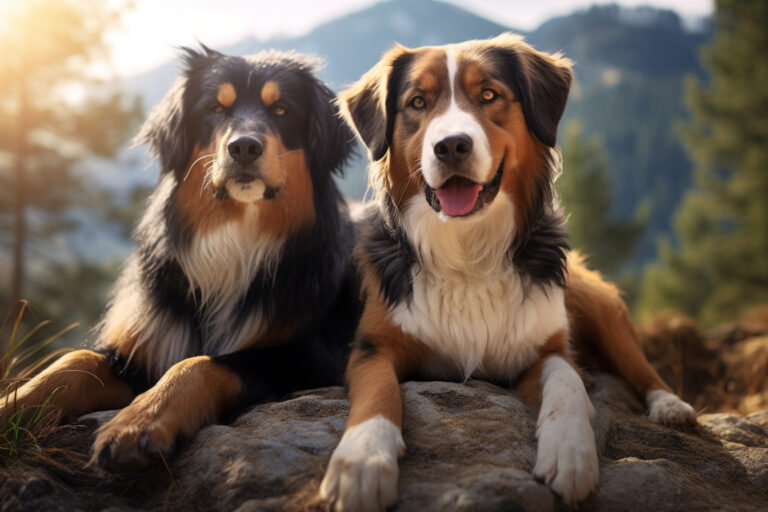Golden Retriever Bernese Mountain Dog Mix: Bernese Golden Mountain Dog Breed
The Golden Mountain Dog, a beloved family dog, is an affectionate mix, mashing up the kind-hearted Golden Retriever and the robust Bernese Mountain Dog mix. This Golden Mountain isn’t just any mixed dog; it’s the perfect blend, boasting a friendly temperament and a strong, muscular build.
These Golden Mountain Dog puppies often have the soft, golden coat of the Retriever, along with the Bernese’s eye-catching black, white, and tan colors. These Golden Mountain Dogs, a cross between the Golden Retriever and the Bernese, can grow quite large, standing as tall as 26 inches and weighing up to 100 pounds.
Their thick, straight fur, much like that of a Golden Retriever mix, needs regular grooming to keep it shiny and healthy. Known as great family dogs, Golden Mountain Dogs are friendly and easy to train.
Golden Mountain Dogs are adaptable to different home settings but need plenty of canine exercise to stay happy. The popularity of these rescue Golden Mountain Dogs paw has increased, showing how much people love these gentle, sturdy companions.
Key Takeaways
- Golden Mountain Dogs blend Golden Retriever and Bernese traits.
- These large dogs need regular grooming and ample exercise.
- They’re sociable and fit well with various family environments.
Golden Mountain Dogs are affectionate hybrids, solid and friendly. They boast a golden coat with distinct Bernese markings. Regular grooming and exercise are essential for their well-being.
Quick Facts
The Golden Mountain Dog is a crossbreed between a Golden Retriever and a Bernese Mountain Dog, standing up to 26 inches tall and weighing between 65 to 100 pounds. This mixed breed often has a lush, medium to long coat, displaying gold, black, and white shades.
Regular grooming is a must to manage their moderate to heavy shedding. Known for their kind and friendly nature, these dogs make excellent companions, though they’re not the best choice for those with allergies.
They typically live around 10 to 12 years.
Golden Mountain Dog Breed Pictures
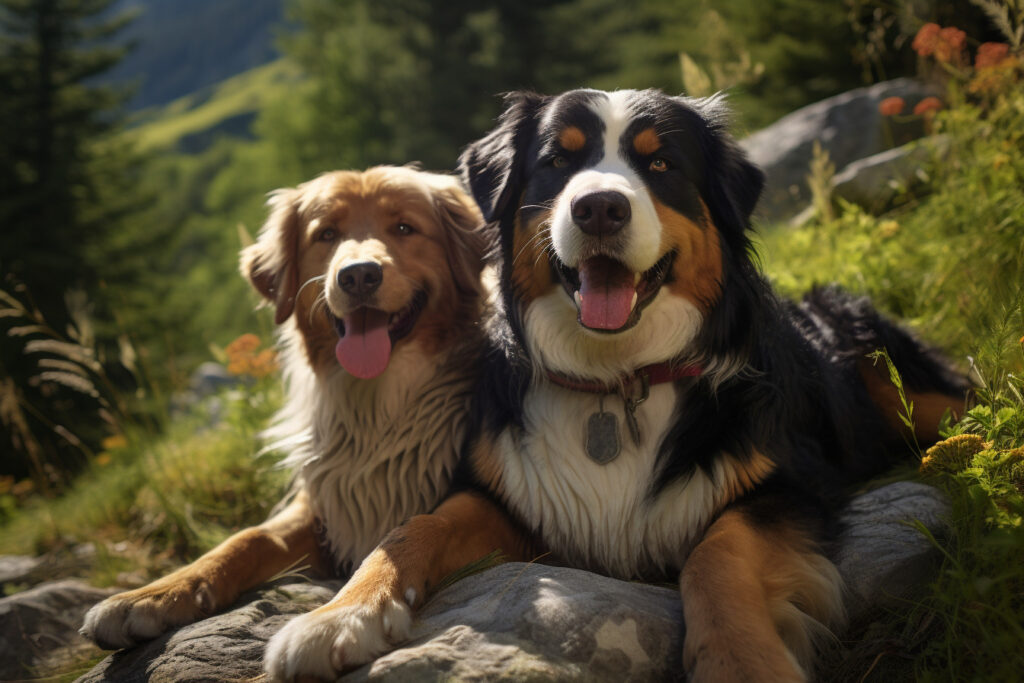
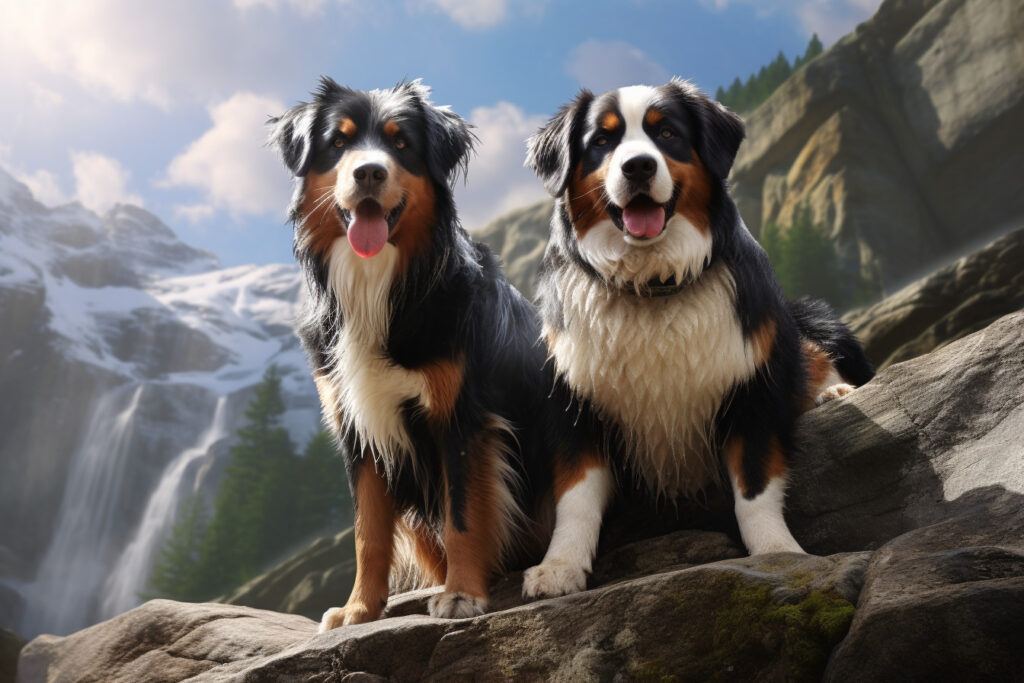
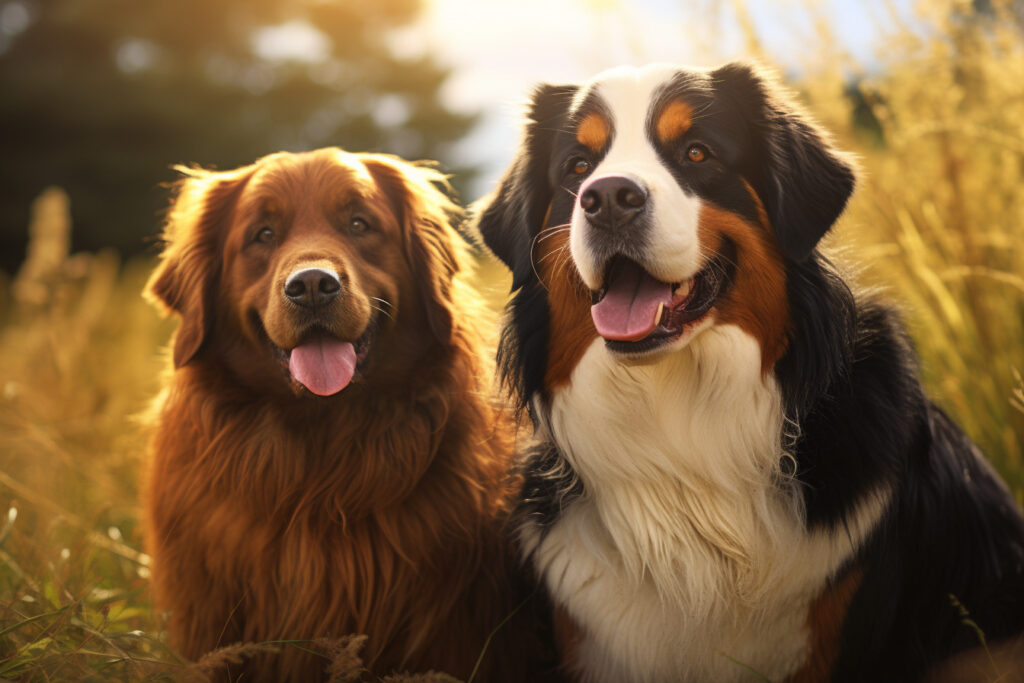

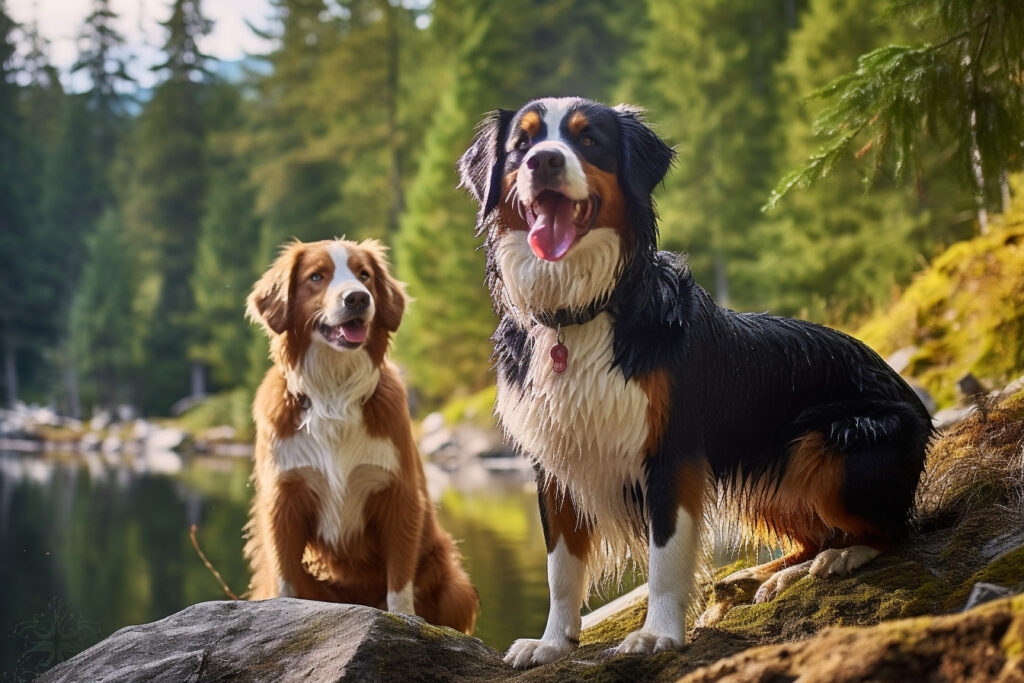

Overview
The Golden Mountain Dog is a newer hybrid breed, known for being a loving addition to the family and carrying a noble air. This mixed breed merges the friendly nature of the Golden Retriever with the strength and devotion of the Bernese Mountain Dog.
Owners often find their Golden Mountain Dogs to have a sizeable build and a fluffy, teddy bear look as puppies, making them attractive pets. However, since they aren’t a recognized breed standard, there’s a lot of variety in how they look and act.
These dogs are usually quite trainable thanks to their smarts and tend to have a calm and friendly personality. However, they can sometimes inherit a tendency towards anxiety from their Bernese lineage.
Breed Hallmarks of Bernese Mountain Dog and Golden Retriever
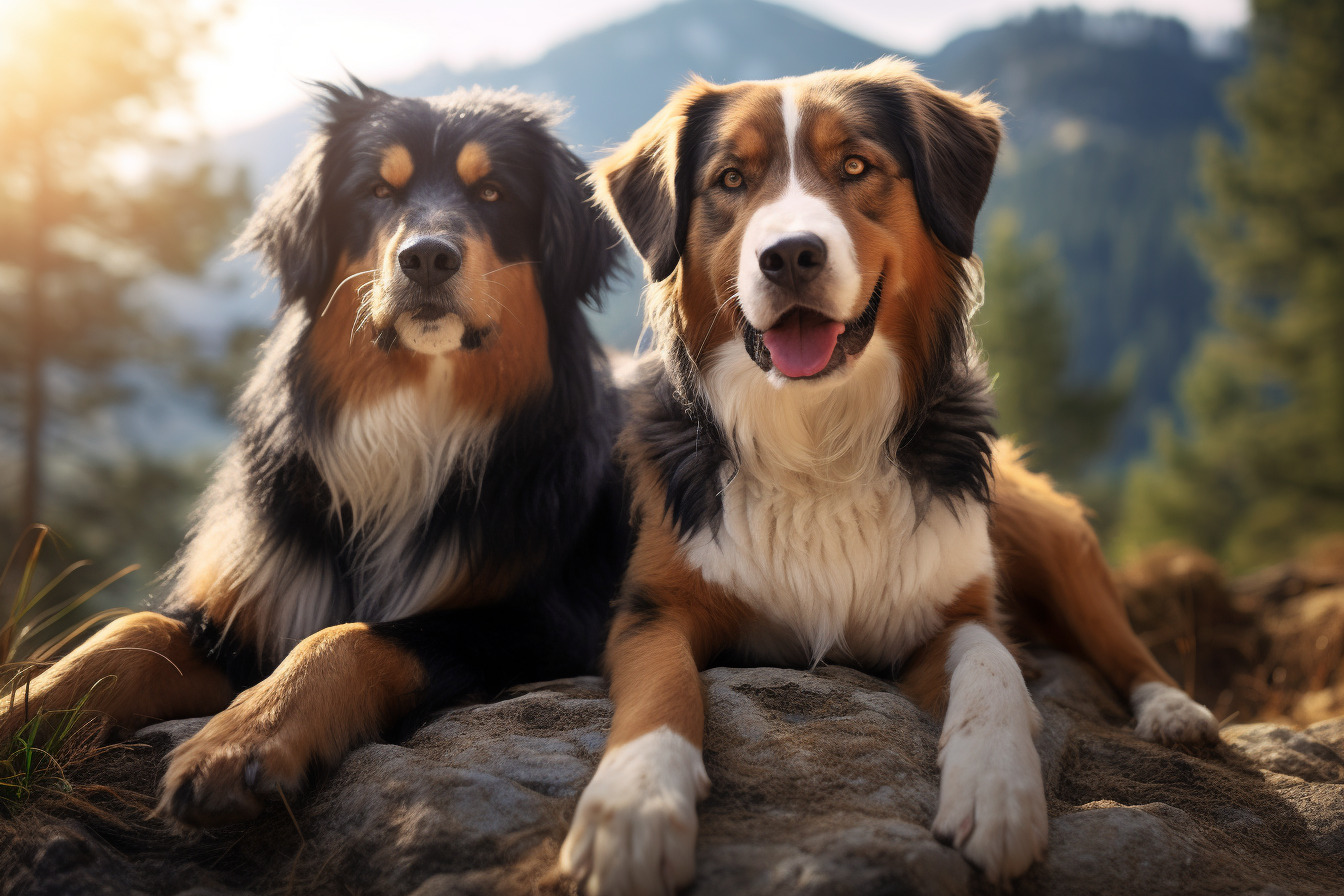
The Golden Mountain Dog is a unique mix, blending the friendly personality of a Golden Retriever with the sturdy build of a Bernese Mountain Dog. This hybrid is intentionally bred to capture its parents’ finest qualities, creating a lovable and resilient dog.
They are a top pick for families because of their agreeable nature and ability to fit into various lifestyles. In terms of size, these dogs are typically medium to large, standing up to 26 inches tall and weighing between 65 to 100 pounds, which is standard for the breed.
Their thick coat often sports the distinctive tri-color pattern of the Bernese Mountain Dog, which requires regular grooming. Regarding their lifespan and demeanor, they generally live between 6 and 12 years and are known for being friendly, making them an excellent fit for family life.
The consistent qualities found in Golden Mountain Dogs explain their appeal to those wanting a devoted and affectionate pet. Understanding these traits helps potential owners recognize what makes this breed an attractive addition to their homes.
Breed Origin Story of Bernese Golden
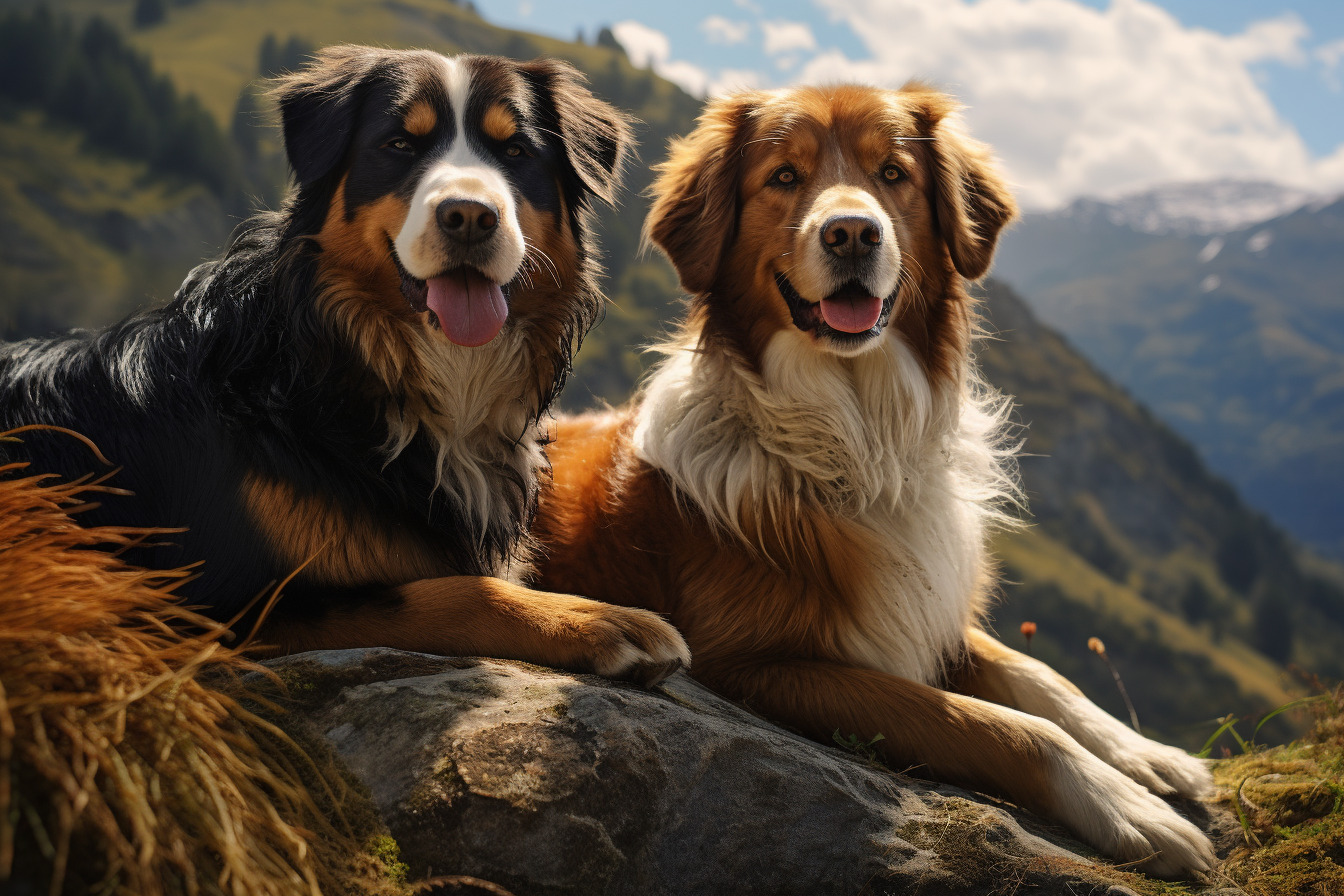
The Golden Mountain Dog is a recent development in dog breeding, aiming to combine the best traits of the Golden Retriever and the Bernese Mountain Dog. This hybrid was intentionally bred to achieve a well-rounded companion, showcasing both breeds’ personalities and physical qualities.
- Historical Breed Development
This mixed breed doesn’t have a long history like many traditional breeds. Their rise in popularity is due to people seeking pets with distinctive qualities.
- Ancestral Lineage Impact
Mixing two purebred lines introduces genetic diversity, which can lead to varying temperaments and health profiles. The resulting dogs may exhibit more traits from the Golden Retriever or the Bernese Mountain Dog.
- Purposeful Hybrid Creation
Breeders select traits like friendliness, smartness, and sturdy build to reduce health issues common in the parent breeds. Responsible breeding practices will significantly shape the future of the Golden Mountain Dog.
Historical Breed Development
Creating the Golden Mountain Dog was a strategic move to blend the admired features of the Golden Retriever and the Bernese Mountain Dog.
Known for their versatile roles in Swiss farms, Bernese Mountain Dogs brought strength, smarts, and a calm nature to the mix. They were paired with Golden Retrievers, cherished for their sociability, ease of training, and skill in retrieving.
The goal was to develop a well-rounded dog, equally at home with families or on the job. However, without a standard for the breed, there’s some unpredictability in the appearance and temperament of these mixed-breed dogs.
Ancestral Lineage Impact
The ancestry of the Golden Mountain Dog greatly influences its physical and behavioral qualities. This hybrid breed gets its robust build and sturdiness from the Bernese Mountain Dog, while the Golden Retriever’s friendly nature and ease of training are also present.
The mix of these purebreds means that the Golden Mountain Dog can exhibit various traits but may also inherit specific health issues. The Bernese side, for example, is known for a predisposition to cancer, which means owners must be proactive with veterinary care.
Conversely, the Golden Retriever’s genes could contribute to a slightly longer lifespan than the Bernese Mountain Dog, though it’s typically shorter than other breeds. Breeders and owners should share their experiences to predict better and manage the health and behavior of these dogs.
Potential owners must understand these factors to provide the best care for their pets.
Purposeful Hybrid Creation
The Golden Mountain Dog is a thoughtfully bred mix, combining the friendly nature of the Golden Retriever with the sturdy build of the Bernese Mountain Dog. Breeders aim for a friendly companion dog that can handle various activities, which is what families often look for.
This breed stands as a prime example of intentional breeding to achieve a set of desirable traits.
Physical Dimensions Bernese Golden Mountain Dog
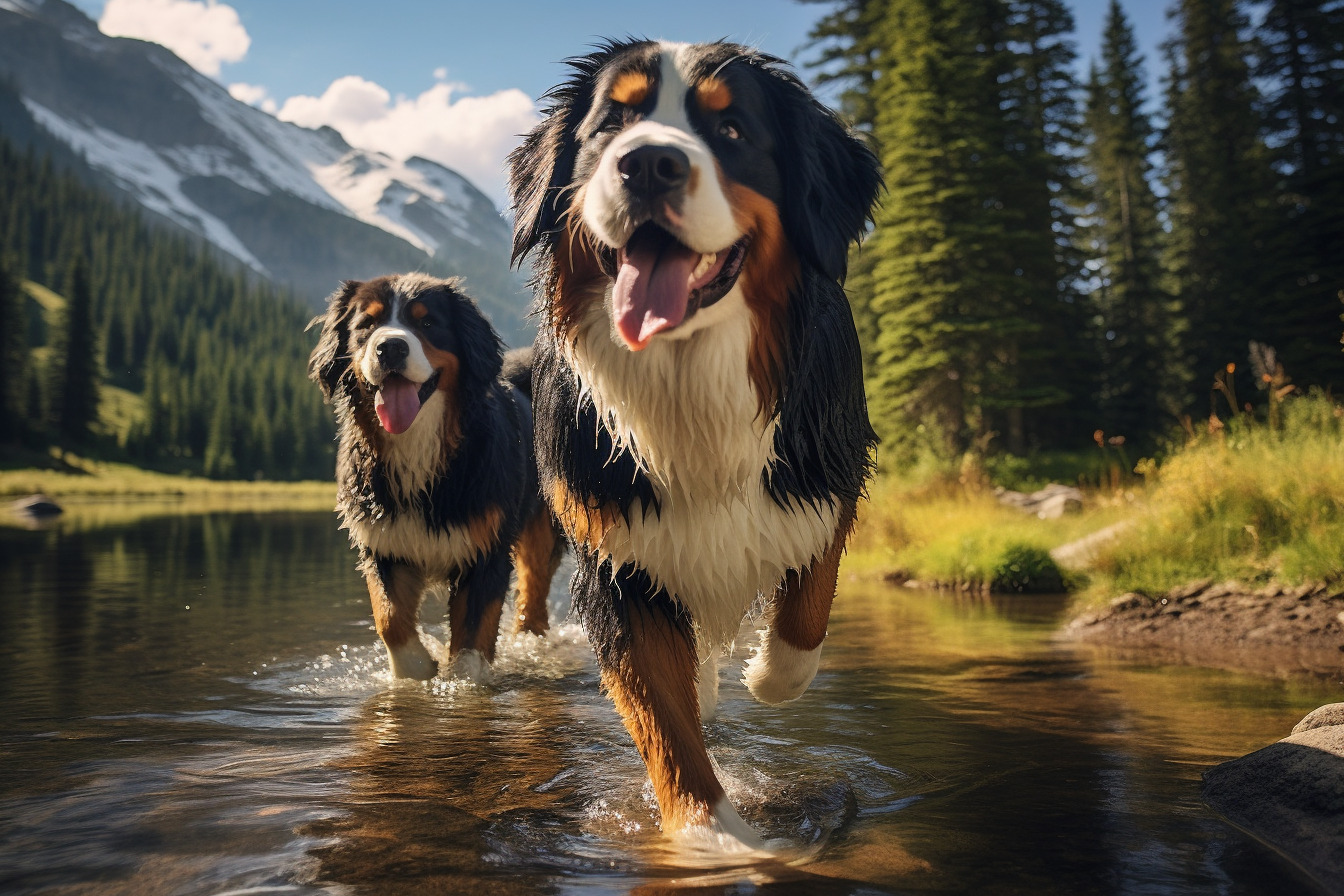
Understanding the physical dimensions of the Golden Mountain Dog helps determine if they’re the right fit for a family or activity. Their size, which ranges from large to extra-large, reflects their genetic diversity. This variation affects their adaptability to different homes and weather conditions.
Golden Mountain Dogs typically weigh between 55 to 115 pounds and stand 21.5 to 27.5 inches tall at the shoulder. Their double coat can vary in length, with some dogs sporting longer or shorter fur depending on their ancestry.
This feature is crucial for potential owners to consider, especially about the climate they live in.
Breed Size Range
Reflecting their ample to extra-large size category, Golden Mountain Dogs showcase varied physical dimensions due to their mixed heritage. These dogs stand tall at 21.5 to 27.5 inches at the shoulder, and their weight ranges from a moderate 55 pounds to a solid 115 pounds.
Their appearance can vary widely, with some exhibiting the leaner build of their Golden Retriever ancestors, while others display the more robust frame characteristic of the Bernese Mountain Dog. Each dog’s unique size reflects the combination of genetics from both breeds and the individual’s health.
Weight and Height
Golden Mountain Dogs stand tall at 21.5 to 27.5 inches and weigh 55 to 115 pounds. Their size is a mix of their Bernese Mountain Dog and Golden Retriever ancestors, known for their large builds.
These dogs often have differing weights and heights, but they typically fall into the larger category of dog breeds. Their solid frame is built for strength and endurance, making them well-suited for various activities requiring physical prowess.
Coat Length Variations
Golden Mountain Dogs have a sturdy build, and their coat length can be anywhere from medium to long, thanks to their Golden Retriever and Bernese Mountain Dog heritage. These variations in fur length significantly affect how much grooming the dog will need.
Shedding is a natural process for these dogs; those with longer hair usually need more frequent grooming. As the seasons change, shedding patterns can vary, so keeping up with brushing is essential to keep their thick fur in check.
Regular and careful grooming helps keep their coat healthy, prevents tangles, and minimizes excess hair, which is better for the dog’s comfort and overall well-being.
Growth Rate Benchmarks
Golden Mountain Dogs usually reach their full height between 12 and 18 months of age but continue to fill out in weight and build for a bit longer. You’ll notice that even after they stop growing taller, these dogs pack on more muscle, and their bodies become more solid.
A Golden Mountain Dog can weigh anywhere from 55 to 115 pounds, and this range depends on their diet, exercise routine, and genetic background. Most of their growth happens when they celebrate their first birthday, but owners must keep an eye on their development.
Proper monitoring ensures the dogs grow at a healthy rate, which is vital to prevent undue pressure on their joints and keep them in good shape.
Typical Build Characteristics
The Golden Mountain Dog is known for its muscular frame, which includes a broad chest, a solid back, and limbs that are in proportion. These dogs are quite large, with heights ranging from 21.5 to 27.5 inches at the shoulder, and they can weigh between 55 and 115 pounds.
Their thick double coat, which comes in various colors such as gold, black, and white, enhances their robust appearance. Observers of this breed will recognize their potential for activities that require strength due to their strong build.
Despite their size and power, Golden Mountain Dogs are also agile, making them efficient companions for various tasks.
Temperament Traits
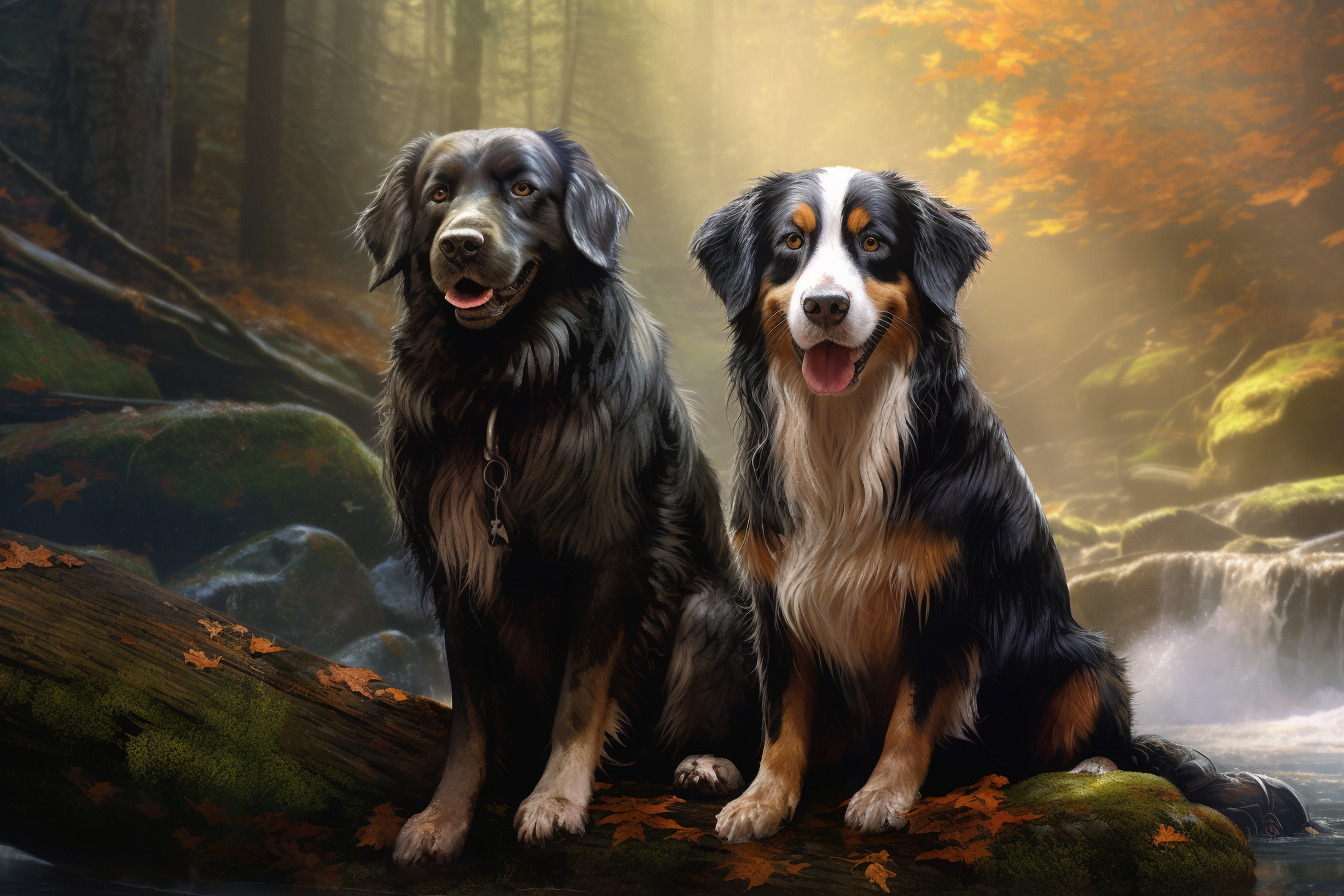
Golden Mountain Dogs are known for their behavioral traits, making them excellent family pets. They inherit their affectionate nature, smarts, and vitality from their Golden Retriever and Bernese Mountain Dog ancestors. Let’s break down what makes their temperament so fitting for a family setting.
Loyal and Loving
These dogs are known for their devotion to their families, often forming strong bonds with all members. They’re also known to be great with kids and other pets, making them a versatile choice for many households.
Smart and Teachable
Golden Mountain Dogs are quick learners, making training a more straightforward process. They respond well to positive, reward-based training, which helps shape their obedient behavior.
Active yet Adaptable
They thrive with consistent exercise to keep them both physically and mentally satisfied. These dogs can adjust well to different living environments as long as they get their daily dose of activity.
Affectionate Family Companions
Golden Mountain Dogs are loving and devoted pets, perfect for a family setting. Their friendly nature and playful behavior make them ideal companions who fit well into homes with people of all ages and other animals.
These dogs have a natural ability to connect with their families, thanks to their intelligent and friendly personalities. Training them is often a breeze because they’re quick learners and enjoy interacting with their human companions.
They show their love in ways that melt your heart, like enthusiastic tail wags and snuggling up close, which makes them a treasured part of any home.
Intelligent and Trainable
Golden Mountain Dogs stand out for their sociability and impressive learning abilities. These dogs inherit their intelligence from Golden Retrievers and Bernese Mountain Dogs, making them quick learners. They are naturally keen to make their owners happy, which makes them respond well to training.
Start training early, and they’ll adapt to various environments, showing flexibility. For the best results, use consistent training methods and positive reinforcement. Golden Mountain Dogs respect household rules and easily fit into family life.
Moderate Energy Levels
Golden Mountain Dogs stand out for their balanced energy levels, which reflect their friendly and intelligent personalities. This balance makes them great companions who can join in fun activities or enjoy quiet time, fitting into various family lifestyles.
They’re especially suitable for first-time dog owners because they can adjust their energy to match the household’s pace, making them easier to train. Early socialization is critical for these dogs, considering their size and potential for lively behavior, to ensure they become well-mannered family members.
Socialization Needs
Socializing a Golden Mountain Dog during their growth phase is essential, especially since they might inherit anxiety from their Bernese Mountain Dog ancestors. Exposure to various people, pets, and places early helps them become well-rounded and confident companions.
Regular interactions with different family setups and the lively scenes of dog parks contribute to their friendly behavior. This approach taps into their natural smarts and familiar traits, making training smoother. Positive reinforcement encourages good social manners and reduces fear in new situations.
Therefore, a solid plan for socializing your Golden Mountain Dog is vital for their friendly and flexible personality.
Protective Instincts
Golden Mountain Dogs are known for being warm and friendly but also have a strong instinct to protect their families. This trait stems from their Bernese Mountain Dog ancestors and is a critical element of their character, showing their dedication to keeping their family safe.
They are keen to judge what’s a normal situation and what’s a threat, preventing unnecessary aggressive reactions. To ensure that a Golden Mountain Dog’s protective behavior is well-managed, focusing on socialization and training from a young age is vital.
This helps them react appropriately in various situations, making them reliable home protectors.
Common Health Concerns
When looking into the health of Golden Mountain Dogs, it’s clear that their genetics can influence specific health issues. These dogs may inherit conditions such as hip and elbow dysplasia, mast cell tumors, or heart issues like subaortic stenosis from their parents.
Understanding Lifespan and Health
Hereditary illnesses can impact the length and quality of a Golden Mountain Dog’s life, the dog’s living environment, and how they’re cared for. Catching diseases early and managing chronic conditions can significantly affect their health outcomes.
Proactive Health Care Approaches
Routine vet check-ups and health screenings are crucial to keeping these dogs healthy. A diet and exercise plan that suits their needs and careful weight and dental care can help reduce the risk of further health complications.
Hereditary Disease Risks
The Golden Mountain Dog, a mix of the Bernese Mountain Dog and the Golden Retriever, risks inheriting health issues from both sides. Mixing these two breeds doesn’t guarantee healthy pups, as they can still get genetic conditions like cancer, which is common in their parent breeds.
They might also get hip and elbow dysplasia, common in larger dogs, which affects their movement and overall well-being. To help these dogs live longer, healthier lives, owners must be proactive with regular vet visits, proper diet, and early disease prevention.
Lifespan Expectancy Factors
Golden Mountain Dogs, a hybrid of Golden Retrievers and Bernese Mountain Dogs, often face health challenges that could affect their lifespan. Issues like cancer and hip dysplasia are common and can significantly shorten their lives.
These dogs may also inherit the Bernese Mountain Dog’s tendency for a shorter life, which potential owners need to consider. To combat these health issues, it’s vital to focus on preventative care and maintain a healthy lifestyle for your pet.
Regular check-ups with a vet and a diet that meets their nutritional needs can help manage inherited and environmental health risks. Keeping an eye out for signs of illness and taking early action can significantly improve a Golden Mountain Dog’s life expectancy and overall well-being.
Preventative Care Strategies
Preventative healthcare is essential for Golden Mountain Dogs to avoid common health problems. Owners must provide a well-rounded routine that suits the breed’s unique requirements.
A balanced diet is vital to keep these large dogs at a healthy weight and prevent excess pressure on their joints, which is a common issue for bigger dogs. They also need regular physical activity to maintain a healthy weight and support heart health.
Keeping up with grooming helps control shedding and prevents skin issues. Meanwhile, regular vet visits are essential for catching any genetic health issues early on, especially cancer, which allows for quicker treatment.
A commitment to these health practices can significantly improve the lifespan and well-being of your Golden Mountain Dog.
Grooming and Exercise Needs
Caring for your Golden Mountain Dog’s grooming and exercise needs is critical to keeping them healthy and joyful. A consistent routine of daily brushing, active playtime, and shedding control is essential for their well-being.
Here’s a straightforward guide:
- Regular Brushing Practices
Brushing your dog’s coat daily to keep it shiny and prevent knots would be best. Please choose the right brushes and combs, and learn techniques to detangle their fur gently.
- Consistent Exercise Routines
Match your dog’s activity sessions to their energy needs to maintain fitness and prevent behavior issues. Regular physical activity is crucial for their overall health.
- Effective Shedding Control
Be aware of their shedding cycles, especially during seasonal changes when they might shed more. You can also include certain foods in their diet to help manage shedding.
Daily Brushing Regimen
Brushing your Golden Mountain Dog daily is essential to keeping their thick coat in good condition and their overall health in check. With their medium to long fur, these dogs are prone to shed a fair amount, so regular grooming is necessary to manage it.
Not only does brushing maintain the coat’s smoothness, but it also helps to limit the amount of hair around your home. It’s also great for spreading the dog’s natural oils across the fur, producing a lustrous shine.
Plus, while you groom, you’ll get to spot any skin issues or pests early on. Grooming can also strengthen your bond with your pet, making it a rewarding part of caring for your Golden Mountain Dog.
Exercise Routine Importance
Regular exercise is vital to the health and happiness of a Golden Mountain Dog. It keeps them fit and helps prevent weight gain, which is common in large breeds.
Tailoring activities to match their moderate energy, like jogging or hiking, keeps them active and reduces behavior problems.
Exercise also supports their mental health, contributing to a stable and calm demeanor.
A consistent workout plan is vital for a Golden Mountain Dog to thrive.
Shedding Management Tips
Taking care of your Golden Mountain Dog’s coat is more than just a grooming routine; it’s vital for keeping your home free of excess fur. Brushing your pet several times a week helps control shedding and keeps their coat shiny by spreading skin oils.
When your dog is losing more fur, perhaps during spring or fall, daily brushing may be needed to avoid tangles and remove dead hair.
Adding regular exercise to your dog’s routine isn’t just good for their health; it can also mean less hair on your furniture, improving blood flow and coat condition.
Stick to a schedule of thorough brushing and physical activity to keep your Golden Mountain Dog looking and feeling great.
Professional Grooming Frequency
Taking your Golden Mountain Dog to a professional groomer every 6 to 8 weeks is critical for maintaining their coat health and overall cleanliness. These dogs have thick, medium to long fur that requires regular care to stay in good condition.
To keep their fur smooth and to manage their heavy shedding, especially during the twice-yearly coat changes, it’s necessary to brush them several times a week, if not daily. Not only does this keep the shedding under control, but it also keeps your home free of excess hair and helps reduce the spread of allergens.
Professional grooming sessions play a big part in achieving these goals for your dog’s well-being and a more allergen-friendly environment at home.
Interactive Play Benefits
Interactive play wonders for a Golden Mountain Dog’s health and grooming routine. Playing fetch or tug-of-war with your dog is not just fun; these activities improve blood flow, which keeps their skin healthy and their coat shiny.
The running and tugging also help remove dead hair and prevent knots in their thick fur, making your job of keeping them looking good much more accessible. Plus, keeping their minds busy with games stops them from getting bored and possibly chewing up your shoes.
Dietary Requirements
Golden Mountain Dogs thrive when their diet is tailored to their specific needs. To keep these dogs healthy and energetic, providing them with the right balance of nutrients is essential. Here’s what their diet should include:
Optimal Food Choices:
A diet rich in high-quality animal proteins is vital for maintaining strong muscles. Including essential fatty acids is critical for a shiny coat and sharp mind, while complex carbohydrates provide lasting energy throughout the day.
Allergies and Sensitivities:
Be aware of allergens like grains and some proteins that might upset your dog. An elimination diet can help identify what foods cause issues, allowing you to create a meal plan that keeps your dog’s stomach happy.
Feeding Frequency:
Regular assessments of your dog’s caloric needs help determine how often they should eat. Proper meal timing can support a healthy metabolism and keep energy levels steady. You must adjust their feeding schedule accordingly as your dog grows or changes in activity.
Optimal Food Choices
Golden Mountain Dogs thrive on a diet of quality proteins, vital fatty acids, and critical vitamins and minerals. Their food should consider their genetic health risks and the need for strong muscles and joints.
A well-thought-out diet includes the right amount of animal proteins to build muscle. Omega-3 fatty acids, often found in fish oil, are essential for their brain health and shiny coats. The proper amounts of calcium and phosphorus are also necessary to keep their large frames sturdy.
Dog owners should work with vets to tailor a diet that meets these dogs’ specific needs, striking a balance to prevent weight issues and promote a long, healthy life.
Allergies and Sensitivities
Caring for Golden Mountain Dogs means paying close attention to their diets, as they could inherit allergies and sensitivities. These issues can affect not only the dogs’ health but also the well-being of people who might be allergic to pet dander.
Golden Mountain Dogs, which tend to shed more, could trigger allergies in some people. Therefore, cleaning the house and regularly grooming these dogs are very important.
It’s also crucial to identify any food allergies the dogs might have to ensure they stay healthy and don’t cause discomfort for their owners.
Feeding Frequency
Feeding a Golden Mountain Dog well requires setting up a regular meal schedule. Giving them several smaller meals daily is often best to keep them healthy and help with digestion.
For this particular breed, how often you feed them is critical to avoiding health issues like bloat, which larger dogs can be vulnerable to. Experts generally suggest giving them two to three meals daily instead of leaving food out all the time, which can lead to overeating and weight problems.
It’s vital to ensure their food intake matches how much energy they use, considering factors like age, activity, and metabolism. To get their diet just right, you should talk to a veterinarian.
They can guide you to ensure your dog receives a balanced diet filled with the nutrients they need, without any excess or shortage that could harm their health.

